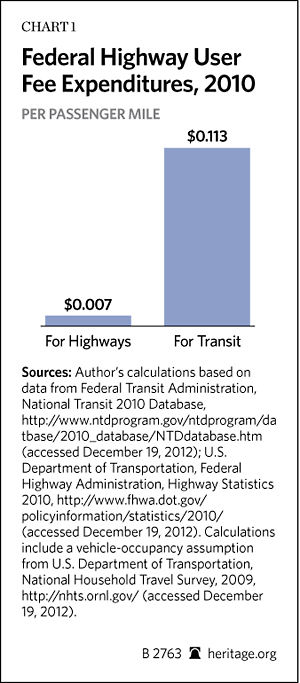Time to Rethink Federal Highway Trust Fund Spending
Emily Goff /
The Highway Trust Fund (HTF), which funds most surface interstate transportation programs, from roads to bridges, faces insolvency in a few short years. In a House Budget Hearing today, one witness—Robert Poole of the Reason Foundation—offered lawmakers a near-term solution akin to what The Heritage Foundation has proposed: Recommit HTF revenue to funding highway and bridge programs only.
As Heritage experts have explained, the original purpose of the HTF was to fund the construction of the interstate highway system. Once the system was mostly complete, lawmakers decided to keep collecting the federal fuel tax that supports the HTF, expand the scope of the federal transportation program, and divert federal user fees to pay for the new programs.
Today, the diversions consist of programs such as transit, environmental mitigation, ferry boats, bicycle paths, and nature trails. In 2010, for example, transit received 17 percent of federal user fees, though its share of the nation’s surface travel amounted to about 1 percent. As Heritage visiting fellow Wendell Cox writes:
Overall, highway user fees supported each transit passenger mile 17 times more than each highway passenger mile ($0.1130 for transit; $0.0067 for highways).
Transit, like the other non–general purpose road activities, is a truly state or local priority and should be funded at those levels of government.
The combination of overspending, inflation, increased vehicle fuel efficiency, and effects of the recession on gasoline consumption in recent years have caused funding shortfalls in the HTF. Rather than address its overspending problem, Congress chose to shore up the HTF with tens of billions of dollars in general fund cash transfers—an imprudent and unsustainable quick fix that worsens federal deficits. As the non-partisan Congressional Budget Office reports:
If lawmakers chose to continue such transfers, they would have to transfer an additional $14 billion to prevent a projected shortfall in 2015.
In the long term, states will need to address how best to fund their transportation programs. Yet in the near term—indeed in the next highway reauthorization bill—Congress should do the following:
- End cash transfers from the General Fund to the HTF,
- Limit transportation spending to available HTF revenue,
- Begin phasing out programs that are inefficient and locally or regionally based, and
- Fund only programs that improve mobility and safety and relieve traffic congestion.
Taking these steps now would mark significant progress toward cost-effectively providing better mobility, increasing safety on roads and bridges, and reducing traffic congestion.


